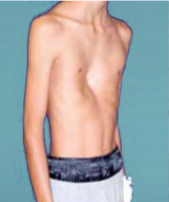The funnel chest (Pectus excavtum) is a congenital clinical condition. With a frequency of 1:1000 it is the most frequent chest malformation and occurs more frequently in boys. There are a variety of different manifestations and degrees of severity. The occurrence or presence of various physical complaints also depends on this. Typically, however, it causes an enormous psychological burden for those affected with increasing age
Our highest goal is to find the suitable therapy for the physical complaints, but also for the psychological strain.
Diagnostic

In the context of an initial assessment, I take a lot of time for a detailed discussion. On the basis of the course of the disease and a thorough clinical examination, I can give you as much information and clarification as possible about the clinical situation. In most cases, the following examinations are then arranged:
examination of Patient’s medical history
- Clinical-Surgical Examination
- Pediatric radiological examinations (X-rays, MRI, 3D reconstruction)
- Pediatric cardiological examination (ECG, cardiac echo, possibly consil)
- Pediatric lung function (possibly with the help of a pediatric lung specialist)
- photo documentation
- Involvement of further child specialists when needed
Therapy
If all findings are present, we can propose a suitable therapy in a detailed consultation with the patient and his or her legal tutor using established algorithms. Important factors are involved:
- Age
- severity
- progression
- physical complaints (pain, cardiac or pulmonary symptoms)
- Concomitant diseases (posture/scoliosis)
- level of suffering
Conservative & Operative Therapy
Professionally competent and “child-friendly” clarification and therapy at the highest international standard – We attach great importance to personal and continuous care for both “conservative” and “operative” therapies.
toddler
Low severity of the deformity
No symptoms
Alternative therapy wish
asymptomatic
Mild severity of the deformity
Special. Physical Therapy
Therapy of accompanying problems
Psychological support
Severe deformity
symptomatical
progressive
New: Minimally invasive method (Yüksel technique)
Minimally invasive operation (Nuss technique)
Open surgery according to Ravitch



